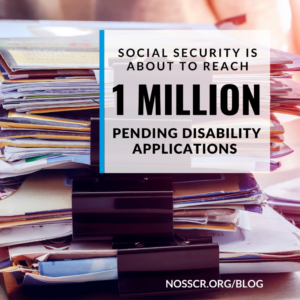We’re Fast Approaching One Million People Awaiting Decisions
We are heading towards a dismal threshold; at the state agencies the Social Security Administration (SSA) contracts with for initial-level medical determinations and the first level of appeals (called reconsideration), there will soon be over a million cases awaiting decisions.
At the end of December 2021, there were 971,426 pending cases: 776,660 initial claims and 194,766 reconsiderations, according to SSA data (which is broken down by state and territory). This is a 9.4% increase over December 2020 and 27.6% higher than the number of claims pending in December 2019.
There are many reasons for this increase, but a high number of applications is not among them. In fact, disability claims have been decreasing for over a decade, and the decline has steepened during the pandemic. According to SSA data, fewer Social Security Disability Insurance (SSDI) disabled worker claims were filed in 2021 than in any year since at least 2006. Data on Supplemental Security Income (SSI) claims show a 17% decrease in child SSI applications and a 13% decrease in applications for people aged 18-64 from 2019 to 2020 (the most recent information available).
The National Association of Disability Examiners (NADE) reported that the national average processing time last year was 165 days for initial claims and 147 days for reconsiderations. In Fiscal Years 2015-2019, the average processing time ranged from 110-120 days for initial claims and 101-113 days for reconsiderations.
More people waiting for disability decisions, and longer waits for the decisions, are taking a toll on individuals, families, and communities. In some situations, eligibility for SSI or SSDI allows an uninsured person to obtain Medicaid or Medicare, so delays in processing disability claims can cause people to delay medical treatment, or leave hospitals and clinics to provide more uncompensated care.
Additional administrative funds for SSA could improve the situation. The House passed an appropriations package that would increase funding, but it hasn’t become law; the federal government is operating on a continuing resolution that freezes SSA’s funding at last year’s level. SSA could also resume the policy it had during the first months of the pandemic when state agencies were directed to focus on initial and reconsideration decisions instead of Continuing Disability Reviews (CDRs), which determine if current beneficiaries have medically improved and no longer qualify for disability benefits.
While there are a number of ways to change course, it requires action. We hope to be able to share a swift resolution soon.
Share!
Follow us
Recent posts
NOSSCR CEO David Camp writes SSA Commissioner Op-Ed for Baltimore Sun
For the first time in many years, SSA has a confirmed Commissioner: Martin O’Malley. NOSSCR CEO David Camp wrote an Op-Ed just published in the Baltimore Sun detailing the changes O’Malley has already accomplished. Commissioner...
CNBC turns to NOSSCR CEO David Camp for insights into SSA overpayments
As the issue of overpayments commands more public attention, the media turns to NOSSCR to lend expertise and depth to this systemic problem. NOSSCR CEO David Camp shared insights in a recent CNBC report examining...
Fee cap increase confirmed for 2024
On February 21, 2024, we brought together NOSSCR and NADR leadership to meet with Commissioner Martin O'Malley at his office in Baltimore. We had a productive discussion with the Commissioner about pressing issues, including the...



